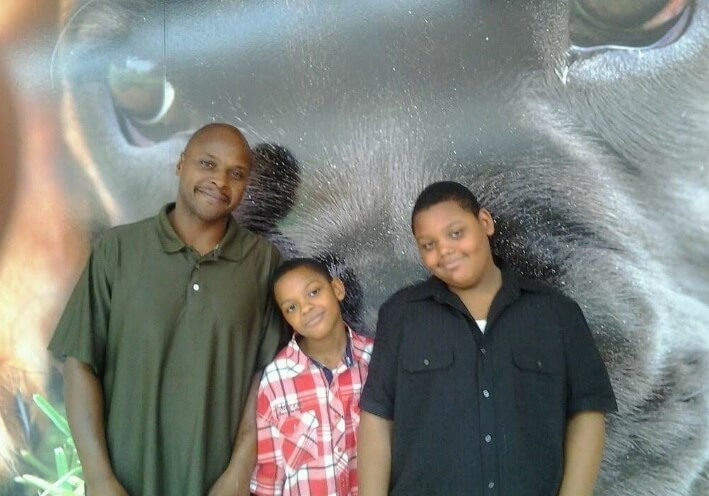Jonathan Owens says he was fortunate to get a second chance at life. By spreading the word, he hopes others won’t need similar luck.
Owens had the same primary care physician for nearly 20 years, and was diligent about keeping himself in shape, as he reached his 50th birthday. Like many of his similarly aged friends, however, he never had a colonoscopy or any other type of colon screening.
Learning he had stage IV metastatic colon cancer shocked and scared Owens, but it also made him resolute. There was still time for him to get treatment — and to share some wisdom.
“My men friends basically have a fear around the whole idea of getting a colonoscopy — I tell them it’s an easy procedure that can save their lives,” says Owens, 58, who is being treated at Dana-Farber/Brigham and Women’s Cancer Center (DF/BWCC). “Besides, wouldn’t they rather know what’s going on in their bodies than not know?”

A disproportionate burden on the Black community
The burden of colorectal cancer disproportionately affects communities of color, particularly Black Americans.
According to the American Cancer Society, colorectal cancer occurs at a higher rate in Black Americans than any other racial or ethnic group in the U.S. African Americans are more than 20% more likely to get the disease. Other factors contributing to the disproportionately high rate of colorectal cancer include a shortage of African American physicians in some areas, lack of familiarity with Black economic and social conditions, and less access to screening services.
Owens hopes that by sharing his story, he might lessen some of that gap.
“I just want to share my experience so that people go get themselves checked out,” says Owens.
His primary oncologist, Marios Giannakis, MD, PhD, agrees with the importance of patients like Owens spreading the word.
“Through courageously raising awareness in their communities, patients like Mr. Owens help overcome some of the barriers to colorectal cancer screening among people of color,” says Giannakis. “We still, however, have a lot of work to do in order to address the disproportionate burden of colorectal cancer in Black Americans.”
[The American Cancer Society and U.S. Preventive Services Task Force recommend that people at average risk begin colorectal cancer screening at age 45. Learn more about risk factors, screening, and the impact of colorectal cancer on the Black community.]
The best medicine
It was Owens’ wife, Nicole, who first noticed the lumps on his neck while giving him a Valentine’s Day hug in 2014. He had a stomach ache later the same day, but didn’t make any connection; he just thought it was heartburn from a big spaghetti dinner.
“Then that night the pain got so bad I couldn’t sleep or even sit up in a chair,” Owens recalls.
Owens went to the emergency room, where he underwent a few tests. He was then sent to Dana-Farber, where doctors diagnosed him with metastatic colon cancer in the form of a tumor the size of a grapefruit.
“I was shocked and scared; I’d never even been sick before,” Owens recalls.
Before he could have surgery to remove the primary tumor, Owens underwent a regimen of twice-monthly chemotherapy sessions at Dana-Farber. Since the operation, he has mostly followed a regular pattern of several months on, a few months off treatment to keep other (metastatic) sites of cancer under control.
“Since his diagnosis with stage IV colorectal cancer in 2015, he has so far done remarkably well with controlled disease and few, if any, cancer-associated symptoms,” says Giannakis. “Nevertheless, having this diagnosis, and treating it, still takes a physical and emotional toll.”

Keeping his head up
A welder for his entire working life, who helped construct buildings including hospitals, Owens has found it difficult to stay on the job given fatigue associated with his treatment. He thanks Nicole, their kids, and his care team at Dana-Farber for keeping his spirits up.
“Dr. Giannakis is sincere and very honest,” says Owens. “I give him and all the nurses high praise, because without them I wouldn’t be here today. Dana-Farber gave me hope, and that’s the best medicine there is.”
Fishing and nature walks also help, as does passing his message along. He had a chance to do so on a large scale recently, when his reflections appeared in a GQ magazine article profiling men of color with colorectal cancer — some even younger than him and being treated at Dana-Farber’s Young-Onset Colorectal Cancer Center. In accompanying photos, a bare-chested Owens reveals the large scars from his stomach surgery.
“It sends a very important message,” says Nicole Owens. “The fear of not knowing what’s going to happen keeps a lot of guys from getting colonoscopies, but like Jonathan says, it’s better to know.”
“Most of my family and friends have died of cancer,” says Jonathan Owens. “God gives you this great gift of life, and you should take advantage of it.”
